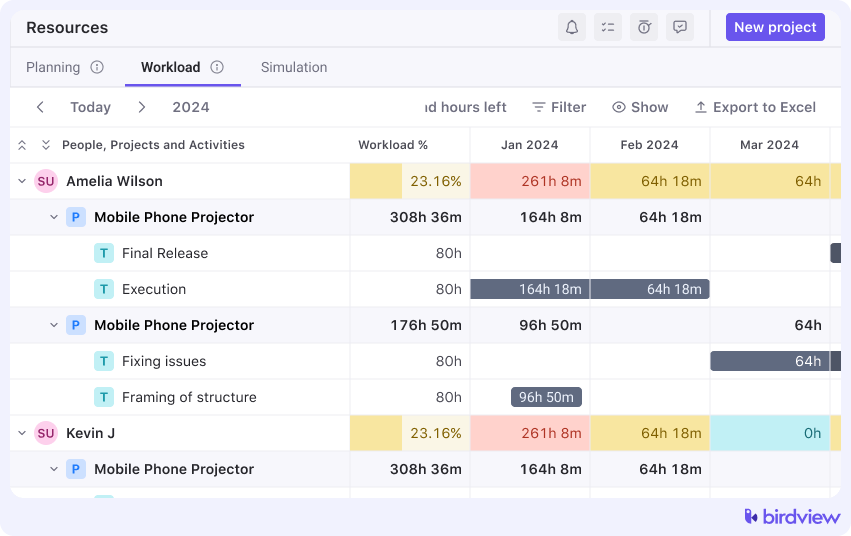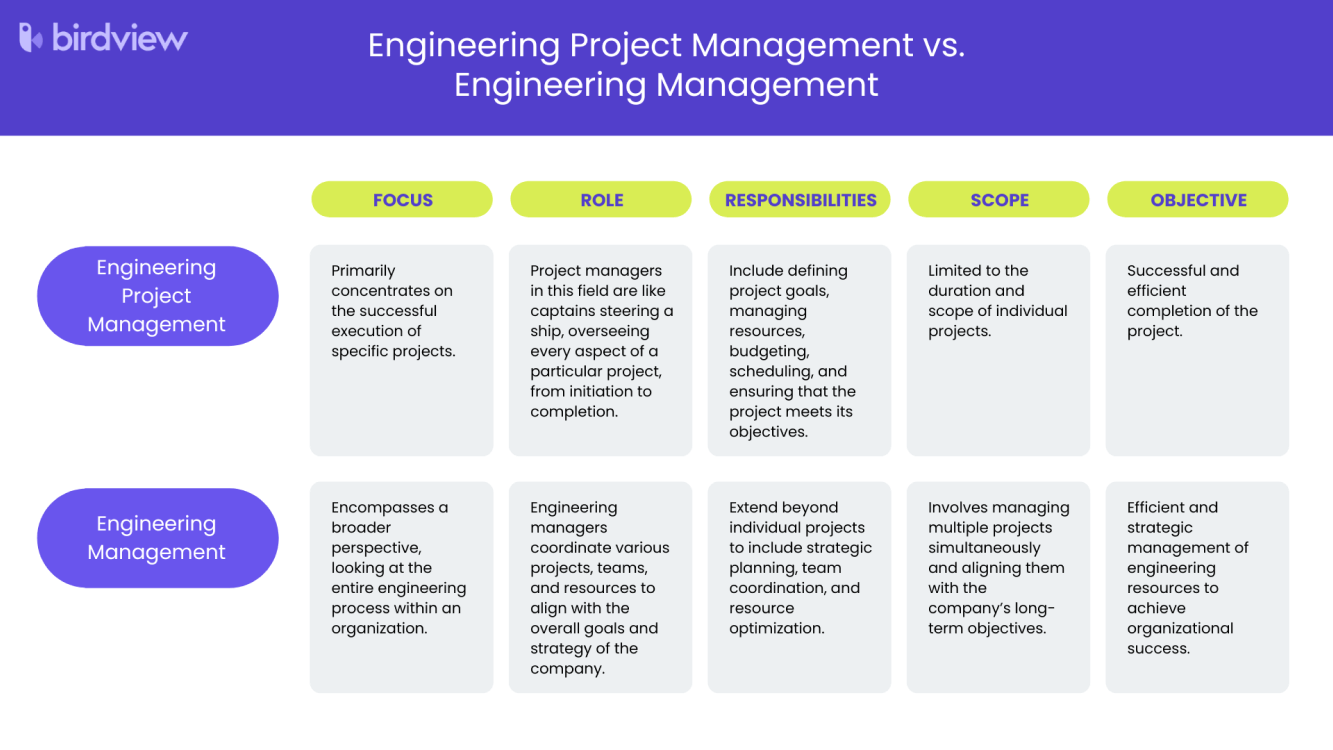Engineering projects are at the forefront of innovation and development, ranging from constructing intricate infrastructures to designing cutting-edge technologies. The management of such projects involves a unique set of challenges and demands a specialized approach.
This article is designed to guide you through effective engineering project management, help you distinguish it from engineering management, and show what skills a good engineering project manager should have. We will enhance your understanding of how these practices support informed decision-making. Additionally, we‘ll introduce project management templates compatible with the engineering project management software Birdview PSA to streamline the initiation of your upcoming projects.
What is Engineering Project Management?
Engineering project management uses a structured approach to plan, organize, and manage projects to meet specific goals and requirements. Unlike general project management, which can apply to a wide range of industries, engineering project management is tailored to the unique needs and challenges of engineering fields, such as civil, mechanical, electrical, and software engineering.
At its core, engineering project management is about transforming ideas and designs into tangible results. This process begins with defining clear project objectives–what needs to be accomplished and why. It then involves breaking down these objectives into smaller, manageable tasks, assigning resources, and setting timelines. Throughout the project, the project manager ensures that all elements, including resources, budgets, and schedules, are aligned with the project‘s goals.
Key principles of Engineering Project Management
These principles of engineering project management are your toolkit for making smart decisions, managing risks, and getting the most out of your resources. By effectively planning limited engineering resources, you can overcome common challenges like tight budgets and deadlines, keeping your projects on track and delivering the innovative results you‘re aiming for.
✅ Clarifying the project‘s core is essential in engineering project management. Engineers and project managers collaborate to define goals, deliverables, and constraints.
💡 Example: In the Channel Tunnel project, defining the project‘s goals, deliverables, and constraints was crucial. Engineers and project managers collaborated to outline key aspects like the tunnel‘s length, safety, and environmental impact, ensuring the project‘s scope was clear. This helped keep the project on track despite challenges such as unexpected geological conditions and political negotiations between the UK and France.
✅ A comprehensive risk management plan covering technical aspects and environmental factors offers proactive solutions to potential issues.
💡 Example: NASA‘s Mars Rover missions highlight the importance of a comprehensive risk management plan. Anticipating potential technical failures and environmental challenges, NASA‘s project managers developed contingency plans for various scenarios. When the Spirit rover got stuck in soft soil, the team quickly adapted, repurposing the rover for stationary research, showcasing the effectiveness of proactive risk management.
✅ Efficient resource allocation– including human capital, time, and budget – is critical in engineering project management. For engineering firms, accurate resource forecasting enables project managers to harmonize resources and achieve optimal results.
💡 Example: The Burj Khalifa‘s construction required meticulous resource management. With over 12,000 workers and just-in-time delivery of materials due to space constraints, project managers had to allocate resources precisely. This careful planning allowed the project to progress smoothly and be completed in just over six years, an impressive feat for such a monumental structure.
✅ Collaboration and communication are paramount. Engineers, clients, stakeholders, and project managers should uphold communication channels to ensure everyone is aligned.
💡 Example: Developing the Airbus A380 involved seamless collaboration across multiple countries. Project managers established robust communication channels and regular coordination meetings to keep teams aligned. Despite initial challenges like design mismatches, the project succeeded due to the strong emphasis on communication and collaboration.
✅ Balancing project requirements within limited budgets and tight timelines is a common challenge in engineering project management. Project managers must employ strategic planning to meet these constraints.
💡 Example: The Sydney Opera House‘s construction faced budget overruns and delays due to its ambitious design. After reassessing the project, strategies were implemented to better balance costs and timelines, such as simplifying design elements and enforcing stricter controls. Though over budget and late, the project‘s completion provided valuable lessons in managing design within practical constraints.
Best practices in Engineering Project Management
Managing engineering projects effectively requires adhering to several best practices, each tailored to meet the unique demands of various engineering disciplines. Below are essential practices and how they can be adapted across different fields like software, civil, mechanical, and electrical engineering.
1. Plan thoroughly
Begin with detailed planning, defining objectives, deliverables, timelines, and resources. A well-structured plan acts as a roadmap for the entire project.
💡 Examples: In civil engineering project management, incorporate physical constraints, regulatory requirements, and environmental impacts into the plan. Use tools like Gantt charts to map out construction phases, ensuring resources are allocated appropriately.
2. Manage risks
Identify potential risks early and create strategies to mitigate them, including technical and external factors like regulatory changes.
💡 Examples: In mechanical engineering project management, extensive testing and prototyping are conducted to uncover design flaws early. Regular risk assessments keep the project on track.
3. Allocate resources wisely
Ensure the right resources–human, material, and financial–are available when needed to keep the project moving forward without delays.
💡 Examples: In software engineering project management, balance workloads among developers, prioritizing critical tasks while preventing burnout.
 4. Foster collaboration and communication.
4. Foster collaboration and communication.
Maintain strong collaboration and communication among all team members, stakeholders, and clients to ensure alignment and prevent misunderstandings.
💡 Examples: For multidisciplinary projects, use collaboration tools and regular meetings to coordinate between different engineering disciplines, ensuring smooth integration of all project components.
5. Monitor and adapt continuously.
Regularly track progress against the project plan, making adjustments as needed to stay on course, especially in dynamic environments.
💡 Examples: In civil engineering project management, conduct weekly site inspections and progress meetings to quickly address any delays or quality issues, making necessary adjustments to resources or schedules.
Comprehensive project planning, risk assessment, and resource allocation are crucial for success. Agile methods enhance adaptability, enabling teams to handle changes in a project efficiently. Professional services automation software like Birdview PSA improves teamwork, efficiency, and quick decision-making. Regular progress checks and early assessment of milestones help identify issues and make timely corrections. Involving clients, management, and all stakeholders throughout the project ensures expectations are met, ultimately enhancing overall project success.
Engineering project management is a dynamic and demanding field that requires a blend of technical expertise, strategic planning, and effective communication. Successfully navigating through the complexities of engineering projects not only leads to the delivery of innovative solutions but also contributes to advancements in the engineering field as a whole. Embracing best practices and addressing challenges head-on are key elements in ensuring the triumph of engineering projects.
PMO services are vital in engineering project management for driving consistency, efficiency, and quality across complex projects. By standardizing processes and equipping teams with the right tools, the PMO helps navigate technical challenges, align stakeholders, and ensure timely, on-budget delivery of innovative solutions.
Engineering Project Management and Engineering Management are two distinct but interconnected fields within the realm of engineering. In general, Engineering Project Management is akin to steering a single ship through the challenges of a specific journey, while Engineering Management involves orchestrating an entire fleet to ensure all ships contribute to the overall success of the navy (organization). Both roles require leadership, strategic thinking, and a deep understanding of engineering principles, but they differ in their scope and focus.

⚙️Engineering Project Management
Focus: Primarily concentrates on the successful execution of specific projects.
Role: Project managers in this field are like captains steering a ship, overseeing every aspect of a particular project, from initiation to completion.
Responsibilities: Include defining project goals, managing resources, budgeting, scheduling, and ensuring that the project meets its objectives.
Scope: Limited to the duration and scope of individual projects.
🎯 Objective: Successful and efficient completion of the project.
🛠️ Engineering Management
Focus: Encompasses a broader perspective, looking at the entire engineering process within an organization.
Role: Engineering managers act as generals overseeing the entire fleet. They coordinate various projects, teams, and resources to align with the company’s overall goals and strategy.
Responsibilities: Extend beyond individual projects to include strategic planning, team coordination, resource optimization, and ensuring that engineering efforts contribute to the organization’s success.
Scope: Involves managing multiple projects simultaneously and aligning them with the company’s long-term objectives.
🎯 Objective: Efficient and strategic management of engineering resources to achieve organizational success.
In essence, Engineering Project Management is akin to steering a single ship through the challenges of a specific journey, while Engineering Management involves orchestrating an entire fleet to ensure all ships contribute to the overall success of the navy (organization). Both roles require leadership, strategic thinking, and a deep understanding of engineering principles, but they differ in their scope and focus.

 Project Engineer
Project Engineer

